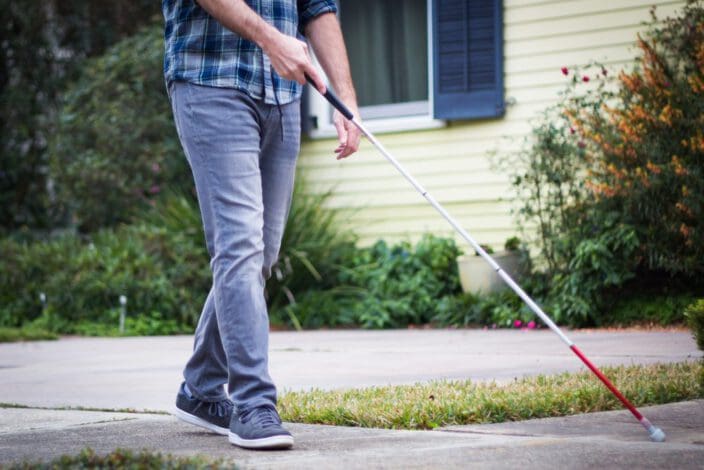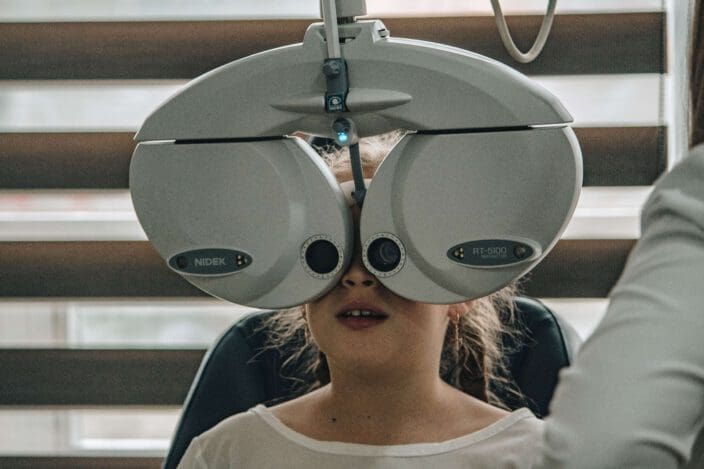Organizations & Resources For Visually Impaired People
Home / Vision Education Center /
Last Updated:
There are myriad resources available throughout the country to make the world more accessible to people living with visual impairments. Programs and services exist to provide educational, career, health, legal, adaptive, and support services for people affected by vision loss.
Table of Contents
One of the oldest foundations in the U.S. dedicated to helping individuals who are blind or visually impaired is the American Printing House for the Blind. This organization strives to break down everyday barriers that people with visual impairments face at home, in the workplace, at school, and out in the community.
The American Foundation for the Blind is a national organization dedicated to expanding employment opportunities for people who are blind or visually impaired. Through original research, development of assistive technology, and raising awareness among community leaders, this organization promotes equal opportunities for people with visual impairments.
Offering a wide range of services, including training and education, assistive technology and products, advocacy, and outreach, the National Federation of the Blind is raising awareness about the capabilities of people who are blind or visually impaired.
The Perkins School for the Blind delivers educational, technological, and accessibility services through four main platforms to children and adults living with visual impairments around the world. Perkins partners with organizations around the world to make the educational and digital worlds fully accessible to blind and visually impaired individuals.
American Printing House for the Blind

The American Printing House for the Blind (APH) is a nonprofit organization that has been offering a wide array of resources for individuals living with a visual impairment and their families since 1858. The goal of APH is to break down barriers that people with visual impairments face, whether in the school setting, workplace, or everyday life, so they can live more independent lives.
These are specific programs offered by APH:
You deserve clear vision. We can help.
With 135+ locations and over 2.5 million procedures performed, our board-certified eye surgeons deliver results you can trust.
Your journey to better vision starts here.
- Vision Aware: The goal of Vision Aware is to encourage independent living for people with vision loss. Resources are offered for emotional support, for everyday living, for working life, and to become connected to visual impairment supports in your community.
- Family Connect: For the parents of children with visual impairments, Family Connect provides information about educational options for their kids and services available for children who are blind or visually impaired. They also offer information on where to find services and parent groups, how to apply for supplemental social security income and additional funding, and much more.
- Career Connect: Through Career Connect, individuals who are blind or visually impaired can explore career options and learn about accommodations for the workplace. They can also connect to a database of over 1,000 visually impaired individuals who volunteer as mentors for young people and adults searching for career information.
In addition to the designated programs at APH, a multitude of educational resources are available for parents, children, adult learners, and teachers working with students who are blind or visually impaired.
Educational resources offered by APH include:
- Common core curriculum.
- Expanded core curriculum.
- Physical education.
- Information on multiple disabilities.
- Accessible textbooks.
- Tactile literacy tools.
- Tools for teachers.
APH can be reached by phone at (502) 895-2405 if you would like to speak with someone about accessing resources that would be beneficial to you. A toll-free customer support line is also available at (800) 223-1839.
American Foundation for the Blind
The primary goal of the American Foundation for the Blind (AFB) is to expand employment opportunities for individuals who are blind or visually impaired. The organization conducts original research, supports the development of accessible products and websites, publishes a monthly magazine titled AccessWorld Magazine, and brings together business leaders, public officials, and policymakers in order to promote equal opportunities for people with visual impairments.
Additionally, AFB advocates for:
- Inclusion at schools, in the workplace, and in the community.
- Children in need of specialized resources, such as books and classroom materials.
- Older adults who wish to remain independent as they experience vision loss.
Along with advocating for people with vision loss, AFB also provides consulting services for organizations who are looking to expand their disability inclusion practices. AFB Consulting helps organizations in retail, telecommunications, finance, education, and technology better serve their employees and clients.
To get in touch with AFB Consulting and learn about how they could help make your workplace more accessible, you can email tgers@afb.org or call (212) 502-7633.
National Federation of the Blind
The National Federation of the Blind (NFB) is the transformative membership and advocacy organization of blind people. Through a network of blind members, they coordinate programs, services, and resources to defend the rights of blind Americans, provide information and support to blind children and adults, and build a community that creates a future full of opportunities.
The NFB emphasizes that being blind or low vision should not hold anyone back from living the life they want.
These programs and services are offered by NFB:
Training and Education
- National Center for Blind Youth in Science
- NFB BELL Academy
- Early childhood initiatives
- Summer programs
- Braille certification
- Career mentoring
- Blind parent mentoring
Advocacy and Outreach
- Advocacy
- Scholarships and awards
- Legal program
- Research program
- Meet the Blind Month
Technology and Products
- Independence market
- Free White Cane Program
- Center of Excellence in Nonvisual Access
- NFB-NEWSLINE
- KNFB reader
- Free Slate and Stylus Program
If you would like to join the NFB community, you must first contact the president of your state affiliate. The NFB has a state affiliate in every state, along with the District of Colombia and Puerto Rico. Contact information can be found through the state affiliate webpages.
The NFB can also be reached directly at (410) 659-9314 or nfb@nfb.org.
You deserve clear vision. We can help.
With 135+ locations and over 2.5 million procedures performed, our board-certified eye surgeons deliver results you can trust.
Your journey to better vision starts here.
Perkins School for the Blind

Perkins School for the Blind is a leading national and international organization focused on providing educational services to children and young adults who are blind, deafblind, or have multiple disabilities. Headquartered in Watertown, Massachusetts, Perkins partners with organizations throughout the United States and the world.
These are the four primary areas of focus at Perkins:
- Perkins School for the Blind: Academic, social, and self-advocacy skill-building is taught to children at the Perkins campus and at public schools throughout the country. Educational partnerships support community and outreach programs, such as the Infant-Toddler Program and transition services to support young adults with vision loss as they enter life after school.
- Perkins International: This program targets the millions of children with visual impairments who are living in poverty around the world and unable to access quality education. Perkins International works to get these children in school, provide their educators with specialized tools to teach blind students, and connect the students and their families with important government and medical resources.
- Perkins Solutions: The primary goal of Perkins Solutions is to break down accessibility barriers for people with vision loss through the use of technology. The program also offers digital accessibility consulting through Perkins Access to ensure that the digital world is accessible to everyone.
- Perkins Library: Since 1837, the Perkins Library has made reading material accessible to people with visual impairments and other disabilities. Currently, over 500,000 pieces of reading material, DVDs, and other forms of content are distributed for free each year. The library also distributes assistive reading technologies and maintains a website to allow the downloads of accessible reading material.
If you would like to contact Perkins School for the Blind to learn more about any of their programs and services, you can contact them directly at (617) 924.3434 or info@perkins.org.
Additional Resources
In addition to the array of programs and services offered by the above organizations, there are many resources available for people who are blind or visually impaired.
- Smartphone apps are available to help people who are blind or visually impaired.
- The National Library Service for the Blind and Print Disabled is a free braille and audiobook library service.
- The American Council of the Blind offers professional employment services, peer support, travel resources, assistive technology resources, manuals and handbooks, and networking and membership resources, among other resources.
- Blindness Support Services, Inc. offers helpful apps, transportation services, libraries for the blind, educational resources, rehab centers for visually impaired individuals, advocacy groups, assistive technology services, and health and wellness services.
- Free braille resources are listed that provide braille books to children for free.
- Resources for parents with visually impaired children are offered by most organizations, including the Vision of Children Foundation and Braille Works.
You deserve clear vision. We can help.
With 135+ locations and over 2.5 million procedures performed, our board-certified eye surgeons deliver results you can trust.
Your journey to better vision starts here.
References
- About Perkins School for the Blind. Perkins School for the Blind.
- About Us. National Federation of the Blind.
- Emotional Adjustment to Vision Loss. Vision Aware: American Printing House for the Blind.
- Overview of Services for Children Who Are Blind or Visually Impaired. Family Connect: American Printing House for the Blind.
- What We Do: How AFB Changes Lives. American Foundation for the Blind.
This content is for informational purposes only. It may have been reviewed by a licensed physician, but is not intended to serve as a substitute for professional medical advice. Always consult your healthcare provider with any health concerns. For more, read our Privacy Policy and Editorial Policy.
